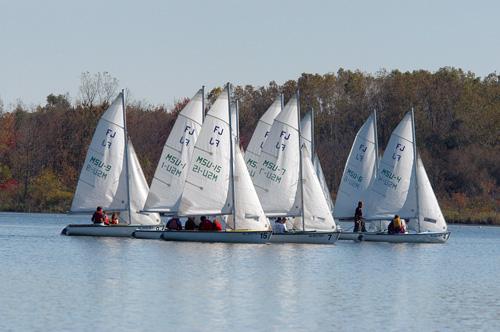UI clubs make some waves

Sep 10, 2008
Central Illinois is rarely thought of as a land of water. While it has plenty of corn and land as flat as a lake’s surface, many believe a tedious drive is necessary to experience the fun of boating, waterskiing or wakeboarding. However, several clubs and organizations at the University prove that a chance to hit the waves is closer than expected.
One of the largest of these aquatic clubs is the Illinois Sailing Club. The club participates in a variety of recreational and competitive events throughout the school year as well as over the summer, said Marilyn Logan, senior in AHS and commodore of the Illinois Sailing Club.
“We love harnessing the natural element and escaping from the bubble of campus,” Logan said.
The group, which numbers around 60 members, is a member of the Midwest Collegiate Sailing Association and participates in a number of sailing races, or regattas, throughout the year, Logan said. These races take place throughout the Midwest, usually at colleges with a lake nearby, such as the University of Wisconsin-Madison, located on the shores of Lake Mendota.
Champaign is not as close to water as other universities, though. The club practices at Clinton Lake, located roughly an hour west of Champaign in DeWitt County. The drive has not been much of a deterrent for students, Logan said.
Get The Daily Illini in your inbox!
“We go out there pretty much every weekend, and sometimes after class just to relax,” Logan said. “How many people get to go out on the water at three in the afternoon?”
Clinton Lake will also be the location of the first regatta hosted by the club since its founding in 1976. The attending schools have yet to be finalized, Logan said. The regatta will take place over the weekend of Oct. 11.
One issue the group has dealt with is the perception of elitism surrounding sailing, Logan said. However, she feels this is unwarranted, because the costs associated with the group are lower than most other sailing organizations.
“We offer a chance to learn sailing skills without paying hundreds of dollars,” Logan said.
Dues for the group are $55 a semester, she said, adding that most of the group’s funds come from fundraising and private donations, as well as from Student Organization Resource Fee funding. These funds helped pay for eight new racing boats that were purchased during the summer for the club’s use, she said.
The group also participates in activities off the water and remains active over breaks. Last winter break, several members spent a week sailing in the U.S. Virgin Islands, while others traveled to Greece this summer, Logan said.
Logan called the fact that even beginners can join and participate one of the best parts of the club.
Members are not required to race in regattas and can sail only recreationally if they wish. She said new sailers usually get the hang of things quickly, but never stop learning and refining their skills. Logan, now the club commodore, had never sailed before joining her freshman year.
Another club that meets on the water rather than in a classroom is the Illini Wakeboarding Team, led by President Tom Pazerunas, senior in LAS.
This club also holds the majority of its practices and events at Clinton Lake, Pazerunas said, and participates in a number of competitions throughout the year. Around 20 schools are represented at most events. Schools from across the Midwest and sometimes even as far away as Pennsylvania are represented, he said, adding that the Illini team is currently ranked number one in the region.
Most wakeboarding teams at other schools are combined with waterskiing teams, but the University’s teams have been separate since 2005, Pazerunas said. He feels this separation gives members more opportunity in the long run.
“There are a lot less events for wakeboarding only, but you’ve got to do them to make it big,” he said.
However, fun on the water does not come without hardship.
“Getting a boat is the biggest challenge,” Pazerunas said.
Motorboats are needed to pull wakeboarders along, and the team currently does not own a boat, forcing them to either rent or borrow one for each event.
Another way students can get onto the water is through Campus Recreation’s Adventure Recreation program. The program offers several instructional clinics each semester for kayaking, canoeing and scuba diving.
They also offer several trips off-campus, said Bob McGrew, assistant director of adventure recreation.
Most classes cost less than $20 for students. Weekend canoeing and kayaking trips to locations such as Wisconsin and Michigan also cost around $20. The program also offers longer, weeklong excursions over breaks, including a trip to the Florida Everglades in January.
The program tries to get as many people involved as possible through outreach to other student groups on campus.
“We’re trying to link up right now to different clubs and activities so we can help send people in the direction of something they’re interested in,” McGrew said.
All these groups are united around a common theme: a passion for the open water.
“It’s all about a love of water and the wind,” Logan said. “What could be better than that?”





